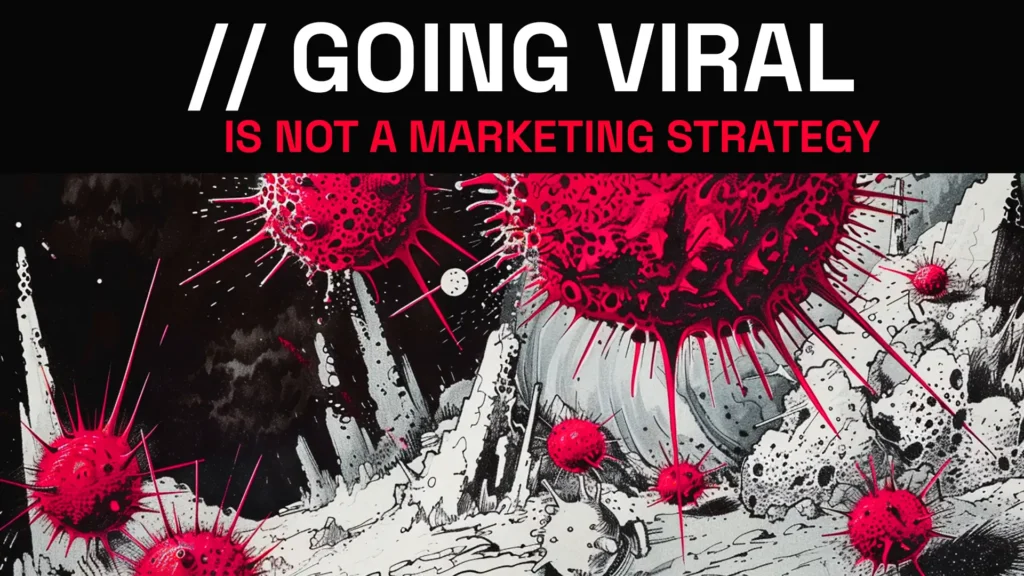
GOING VIRAL IS NOT A MARKETING STRATEGY
“Going viral” has become a dream for many marketers and businesses. The allure of reaching millions overnight and gaining instant fame is undeniably appealing. However, chasing viral success is often fueled by superficial motives and can lead to disappointing results. In this article, we’ll explore why trying to go viral is more about ego and pride than sound marketing strategy, and we’ll discuss a more effective approach to building a strong marketing foundation.
VIRAL MARKETING IS OFTEN SHALLOW AND SELF-SERVING:
Viral marketing campaigns frequently rely on shock value, humor, or emotional manipulation to grab attention. While these tactics can generate buzz, they often lack substance and fail to showcase the true value of a product or service. Many viral campaigns prioritize boosting the creator’s ego over providing genuine value to the audience.
The obsession with going viral can lead to an unhealthy focus on vanity metrics like likes, shares, and views. These metrics might provide a temporary ego boost but don’t necessarily translate into tangible business results. Virality is not a business model. It’s a tactic that can be used to achieve a business goal. Focusing solely on virality can distrac from creating meaningful, long-lasting connections with your target audience.
GOING VIRAL DOESN’T GUARANTEE FINANCIAL SUCCESS:
Increased visibility and brand awareness from going viral don’t automatically lead to financial success. Many viral sensations struggle to monetize their newfound fame, facing the reality of short attention spans and fickle audiences.
Consider the case of Alex from Target, a teenage Target employee who went viral on social media in 2014. Despite gaining millions of fans overnight, Alex struggled to capitalize on his sudden fame and eventually faded into obscurity. This example demonstrates that viral success is often fleeting and doesn’t guarantee long-term financial stability. Instead of relying on the unpredictable nature of virality, businesses should focus on building a solid foundation for sustainable growth.
VIRAL LEADS ARE OFTEN LOW-QUALITY:
Even if a viral marketing campaign generates leads, they’re often low-quality and unlikely to convert into paying customers. Viral content tends to attract a broad, general audience that may not be genuinely interested in the product or service being offered.
A University of Pennsylvania study found that only 1% of customers acquired through viral marketing campaigns made a repeat purchase, compared to 13% of customers acquired through paid advertising. This suggests that viral leads are often less valuable than those acquired through targeted marketing efforts. By focusing on attracting the right audience rather than chasing viral fame, businesses can improve lead quality and increase the likelihood of conversions.

THE ALTERNATIVE: BUILDING A STRONG MARKETING FOUNDATION:
Instead of chasing viral fame, businesses should focus on establishing a strong marketing foundation using best practices. This includes:
- Developing a well-researched and thought-out marketing strategy that aligns with business goals and target audience needs.
- Creating a strong and consistent web presence, including a user-friendly website, engaging social media profiles, and valuable content.
- Implementing targeted digital advertising campaigns to reach the right audience at the right time.
- Continuously analyzing and optimizing marketing efforts based on data-driven insights to improve performance and ROI.
By prioritizing these foundational elements, businesses can create sustainable growth and build lasting relationships with their customers. This approach may not have the immediate gratification of going viral, but it sets the stage for long-term success and a more stable return on investment.
CONCLUSION:
While the idea of going viral is tempting, it’s essential to recognize that it’s often driven by ego and pride rather than sound business strategy. Viral success is often superficial, short-lived, and doesn’t guarantee financial success. Instead of chasing viral fame, businesses should focus on creating genuine value for their target audience and building a strong marketing foundation. By prioritizing substance over style and investing in best practices like a well-researched strategy, consistent web presence, targeted advertising, and continuous optimization, companies can achieve sustainable growth and long-term success in the digital age.


